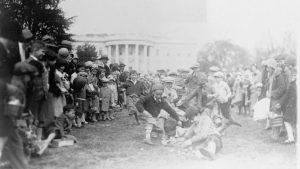These days it’s almost unremarkable for countless artists to release new Christmas albums each year, but there was a time, not too long ago, when the radio stations didn’t fill the air waves with holiday tunes from Thanksgiving until Christmas day. Christmas music went through a stark evolution in the 20th century, changing from religious carols and hymns to a completely new, secular genre. Many do not know, however, that this is due in large part to the timeless classic, “White Christmas.”
“White Christmas” was written by Irving Berlin, in 1940, for a musical he was developing. Berlin, who was Jewish, did not celebrate Christmas, but he and his wife had lost a child on Christmas Day, so he had a deep sense of the wistful longing the season brings. After staying up all night writing the tune he knew he had a hit and so he called up his secretary and told her:
“Grab your pen and take down this song. I just wrote the best song I’ve ever written—heck, I just wrote the best song that anybody’s ever written!”
The heartwarming song was first performed by Bing Crosby on his NBC radio show The Kraft Music Hall on Christmas Day, 1941, right after Pearl Harbor and the US entry into World War II. Crosby subsequently recorded the song in only 18 minutes, this was relatively unheard of in a time before 8-track recording and editing. In those days recordings had to be perfect in one take or you had to start all over. Bing didn’t think much of the track at first, commenting, “I don’t think we have any problems with that one, Irving.”

Read more:
Check out these amazing, rare photos of the first White House Easter Egg Rolls
At first, the holiday song was overshadowed by the musical Holiday Inn’s first hit song, “Be Careful, It’s My Heart.” The following year, however, “White Christmas” topped the charts — driven by the nostalgia of troops separated by war from their loved ones — and established that there could be commercially successful secular Christmas songs.
The tune was such a hit that it even made it to the top of the Harlem Hit Parade, which was the first time that Crosby had made it onto the Black-oriented chart. In a time when racial divides were strong, “White Christmas” proved that Christmas music could thrive in any market and be enjoyed universally. In 1942, after appearing in the musical Holiday Inn, “White Christmas” won the Academy Award for Best Original Song. Twelve years later, the tune inspired its own musical of the same title, which was the highest grossing film of 1954.
The popularity of “White Christmas” opened the door for the plethora of holiday songs and albums that we enjoy today. Even with all the new seasonal singles, “White Christmas” remains the most popular and has been recorded more than 500 times. Some of the artists who have covered Berlin’s greatest work include Frank Sinatra, Andy Williams, Michael Bolton, and Bette Midler.
While Crosby’s original remains the standard, we say the best rendition of White Christmas was recorded in 1956 by a band called The Drifters. The arrangement is marked by a change in octave for the second verse and the background vocals give the impression that they were having a great time recording it.
If you think this one isn’t the best, leave a comment and tell us which is your favorite version of “White Christmas.”
